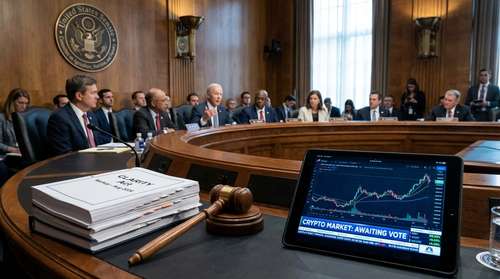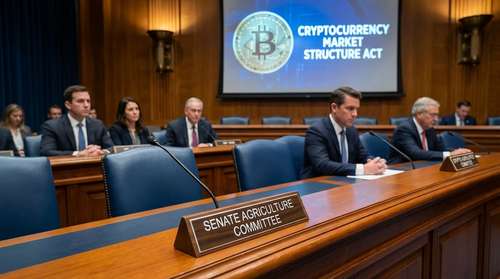The U.S. crypto scene has always been a battleground where legislative ambitions and technological innovation clash. More recently, the crypto policy pivot seems to be taking shape under the shadow of significant resistance, especially from Democratic Senator Warner. As debates rage over how to protect software developers from liability while also keeping market regulations robust, the crypto community is gearing up for an intense showdown in Washington. This development is not just a matter of legal fine print; it’s a battle with real-world consequences for the entire cryptocurrency ecosystem.
With Senator Warner’s cautious approach, many in the industry see a clear obstacle to the streamlined cryptocurrency legislation they have long sought. His resistance is emblematic of broader tensions within U.S. crypto regulation—a dance of progress and caution. In conversations throughout the community, many have expressed the sentiment that the stakes have never been higher, especially as the Senate reconvenes to tackle crypto legislative challenges head-on.
Senator Warner’s Crypto Stance and Its Implications
Senator Warner has become a key figure in the unfolding narrative around cryptocurrency legislation. In this section, we explore how his nuanced, yet firm, resistance is reshaping debates on crypto policy. His approach is seen by many as a critical counterbalance to the ambitions of crypto lobbyists pushing for extensive developer protections. This stance is influencing the broader crypto regulation debate in ways that could redefine the contours of U.S. crypto aims.
Senator Warner frequently emphasizes the importance of maintaining strong consumer protections and financial safeguards. His insistence on accountability and clarity in crypto regulation presents a real challenge to the industry’s goal of a liability shield for software developers. Some critics argue that such resistance could stifle innovation, while others believe that a measured regulatory framework will ultimately cultivate a healthier market environment.
Every time crypto policy is discussed on Capitol Hill, Warner's name tends to be front and center. It’s almost as if his presence in the debate acts like a barometer of how far U.S. crypto regulation can stretch while still protecting citizens. His perspectives serve as a reminder that while innovation is crucial, there is an equally vital need for transparency and responsibility in this burgeoning space.
For those in the cryptocurrency world, Warner’s position is more than just political posturing—it’s a stark reminder that any major crypto legislative challenge must account for both innovation and consumer protection. His firm crypto resistance makes it clear that policymakers are not willing to sacrifice oversight for the sake of rapid technological progress, a sentiment shared by many stakeholders across the industry.
The Senate's Crypto Legislative Agenda
Now that the Senate has returned to session, cryptocurrency legislation is taking center stage, with new proposals and amendments sparking heated discussions. In this section, we delve into the Senate's crypto legislative agenda and what it means for the future of U.S. crypto regulation. Legislators are pushing for clearer frameworks that promise to protect the industry while ensuring accountability.
The proposed bills seek to address long-standing issues in the crypto industry such as developer liability, market transparency, and consumer protection. Some lawmakers argue that by providing a safe harbor for developers, innovation will thrive, paving the way for more robust technological advancements. However, critics, including Senator Warner, contend that these measures might lead to lax oversight and unforeseen risks for investors.
Inside the political corridors of Washington, the debate often comes down to a simple question: how can regulation be both flexible and firm? The Senate committee discussions reveal intense negotiations, with some lawmakers urging more comprehensive guidelines, while others insist that too rigid a framework could deter investment and technological growth. It’s a classic case of walking a tightrope between fostering creativity and ensuring stability.
This legislative struggle is not merely academic—it affects countless developers, investors, and everyday users. By seeking to protect software developers from liability, the industry hopes to create an environment where innovation isn’t hampered by legal risks. Yet, as Senator Warner points out, the broader responsibilities of protecting consumers and maintaining market integrity cannot be overlooked.
Impact on U.S. Crypto Regulation and Policy
Looking beyond the immediate legislative battles, Senator Warner’s resistance could have a long-lasting impact on cryptocurrency U.S. policy. In this section, we look at how his stance might shape the future landscape of crypto regulation and policy in the United States. The ramifications of these debates extend far beyond Capitol Hill—affecting everything from startups to established financial institutions.
Senator Warner’s cautious approach represents a fundamental shift in how policymakers view technology-driven sectors. Instead of embracing a one-size-fits-all model, his arguments suggest that each facet of the crypto ecosystem requires tailored guidelines. His skepticism about broad liability protection for developers pushes the conversation towards ensuring that all participants in the financial ecosystem are held to common standards of accountability.
The impact of such regulatory debates is palpable. For example, many in the crypto community compare the current environment to a high-stakes chess match, where every move could either advance or hinder progress. Regulations that swing too far in any direction might either fuel unchecked innovation or put undue pressure on market stability, leading to unexpected economic ripples.
Incorporating real-world experiences, many developers have shared stories of how uncertain regulations have slowed down some promising projects. These anecdotes, whether viewed as cautionary tales or opportunities for reevaluation, underscore the complexity of crafting robust crypto policy. As the crypto regulation debate intensifies, it becomes clear that achieving balance is imperative for sustainable growth in the industry.
Rhetorically speaking, isn’t it fascinating how a single senator’s position can pivot an entire policy direction? This duel between innovation and regulation highlights the importance of compromise and dialogue in shaping legislation that works for everyone. The debate over crypto legislative challenges continues to be dynamic and engrossing, revealing just how entangled the interests of technology, finance, and governance truly are.
For many, the journey through these legislative corridors is as nerve-wracking as it is promising. Senator Warner’s crypto stance serves as both a challenge and an opportunity—a call to lawmakers to think holistically about the implications of rapid innovation. His fight to align consumer protection with technological advancement mirrors broader economic challenges that the U.S. faces on many fronts.
Ultimately, the evolution of U.S. crypto regulation will rest on the ability of lawmakers to embrace change without sacrificing the foundational principles of fairness and safety. The debates unfolding today will likely define the contours of the crypto landscape for years to come, setting the stage for a more balanced and sustainable regulatory framework.
There’s no doubt that the dynamic between progressive steps in blockchain technology and the conservative approaches of longstanding regulators will keep the crypto community on its toes. As we move forward, keeping a sharp eye on how these regulatory challenges are addressed will be crucial for anyone invested in the future of cryptocurrency in the United States.




